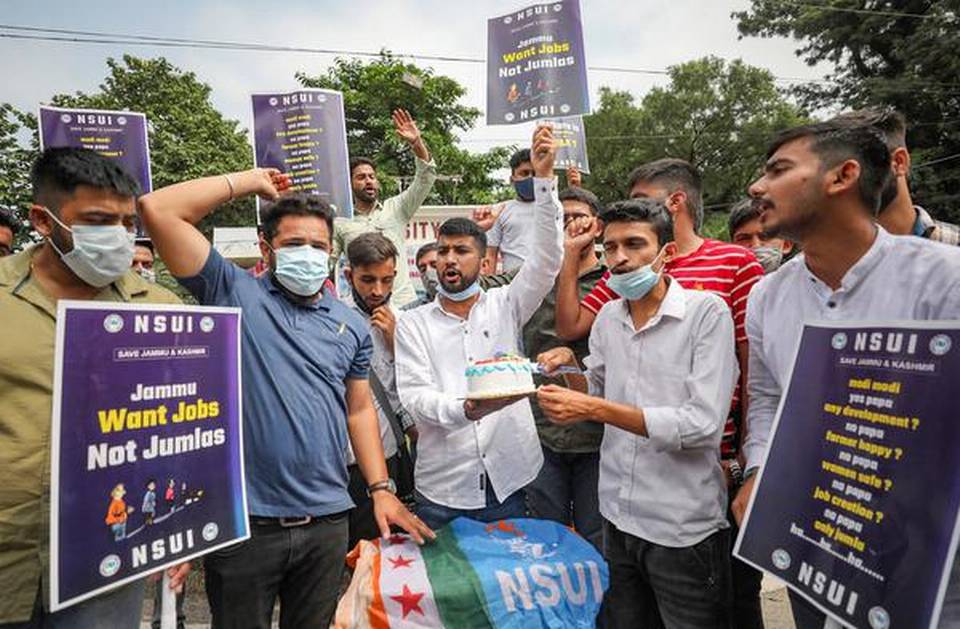The official joblessness rate of J&K and Ladakh hit 17.8% in October-December of 2020.
The J&K’s unemployment bulge is witnessing a major swell in the face of disengagements of employees, mergers of government departments, and snail pace recruitments, which has resulted in the Union Territory (UT) figuring among the States facing the highest unemployment rates.
Working as a helper for around 20 years, Mehjabeen Akhtar, in her 50s, is among the 918 supervisors and helpers disengaged by the Integrated Child Development Services (ICDS) — which looks after pregnant ladies, lactating mothers, and children from lower-income groups — this month. The ICDS helpers would live off on the meager salary of ₹2,500 per month, but even that was stopped over three years ago.
“One of the reasons for my divorce from my husband was the ICDS job. I refused to accompany my husband to Bengaluru and preferred to be independent because of the job. Now I am left at the crossroads because of the government decision,” Ms. Akhtar, a resident of Anantnag, told.
Weekly protest
Ms. Akhtar, who is now president of the ICDS Helpers and Supervisors Association, is busy planning a weekly protest, which will see the participation of widows, orphans, and other destitute, mostly women, who are among the disengaged lot.
“Even the children of the disengaged employees who have been left in the lurch will join,” she said.
Many of the helpers were even deployed for election duties in volatile pockets in Kashmir in the past. Ironically, the Social Welfare Department has around 6,000 vacancies, official sources said.
Farooq Ahmad Khan, the adviser to J&K Lt. Governor Manoj Sinha, has defended the government decision. “All these helpers were brought into the department through backdoor entries as none of them have any appointment order,” Mr. Khan said.
However, Ms. Akhtar showed an order of engagement issued by a senior officer. “We were assured of permanent engagement even by former J&K Social Welfare Minister Sajad Lone. How is it possible that all were backdoor appointees?” she asked.
The UT has seen growing disengagement of youth into several government schemes providing livelihood. Qaiser Ahmad, a B.E Civil, was among 4,433 engineering professionals who ran 1,145 self-help groups (SHGs) helping in completing low-budget government projects.
Struggling to make ends meet
“The scheme has been dysfunctional since 2019. We are struggling to make ends meet,” Mr. Ahmad said. According to official figures, no such group was engaged this year.
CPI(M) leader M.Y. Tarigami said 234 supernumerary posts of forest guards created for the engagement of registered unemployed forestry graduates and postgraduates have also been abrogated.
Officials said the unbundling and restructuring of the Power Development Department; merger of the State Industrial Development Corporation (SIDCO) and the Small Scale Industrial Development Corporation (SICOP); and revamping of the J&K Cements Limited have also resulted in fewer job opportunities.
Official figures suggested that the J&K administration has advertised around 10,000 jobs, of which 8,575 were Class IV posts — ever since the new domicile laws were introduced in May 2020, which will also allow a section of non-locals to apply. However, the results are still awaited.
According to the Ministry of Statistics and Programme Implementation (MOSPI), the combined unemployment rate of J&K and Ladakh hit the highest 17.8% in October-December of 2020, against the national average was 7.11%. The Centre for Monitoring Indian Economy put the unemployment rate at 12.13% in J&K in 2017. Since the fall of the coalition government of the Peoples Democratic Party (PDP) and the BJP in 2018, recruitments have significantly slowed down.
L-G expects the creation of five lakh jobs
Around 48,908 unemployed youth have registered with the J&K Department of Employment up to June 2021, which included 21,205 post-graduates. The government departments remain the highest employers in the UT because of the lack of big industries or corporates.
However, L-G Manoj Sinha said he was expecting the creation of five lakh jobs as the UT is all set to get ₹25,000-30,000 crore of private investment.




